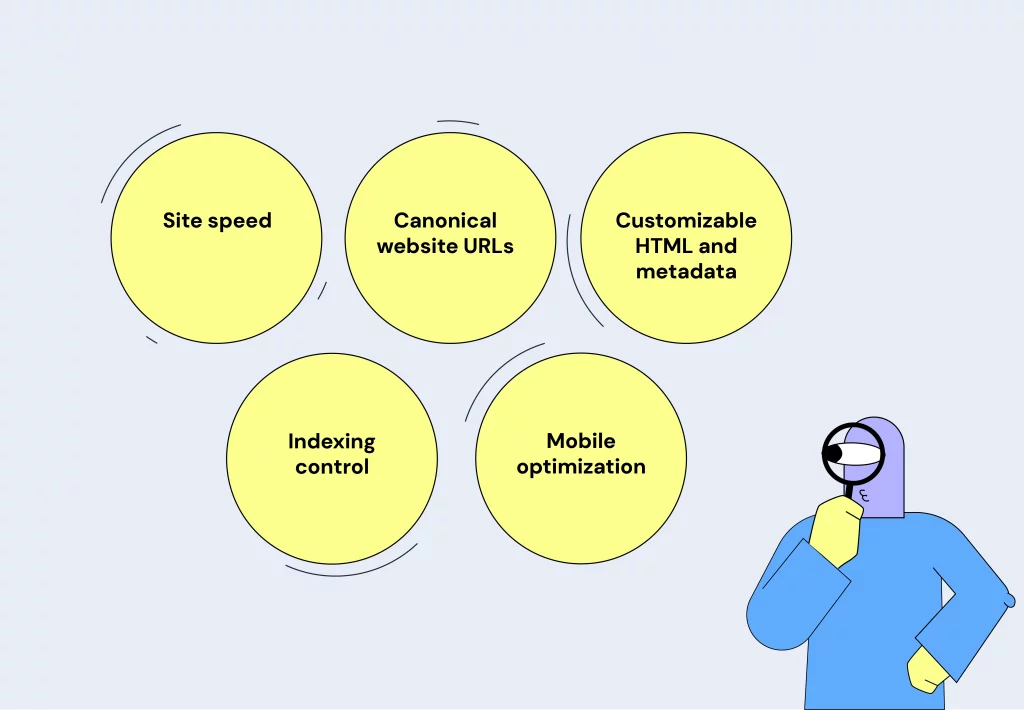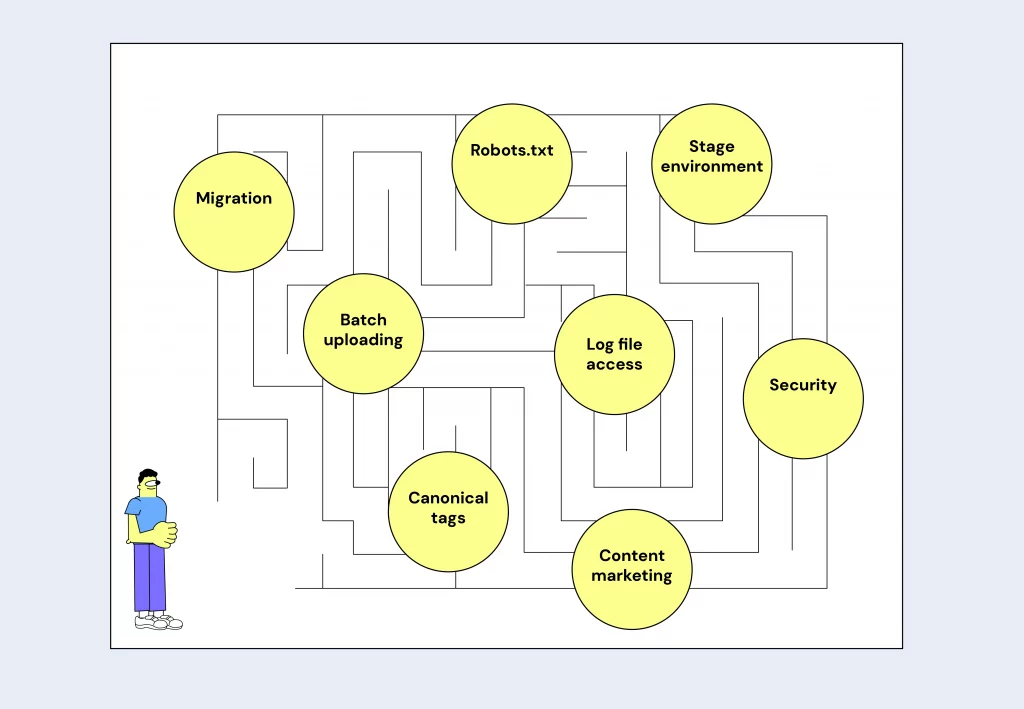n today’s digital age, having a solid online presence is crucial for businesses to succeed. E-commerce platforms are a popular choice for businesses looking to sell their products or services online. However, not all e-commerce platforms are created equally regarding search engine optimization (SEO).
SEO is essential for driving traffic to your online store and increasing sales. In this article, we will explore five of the best e-commerce platforms for SEO, providing insights to help you decide which platform to use for your online business.
Why Is SEO So Important for E-Commerce Websites?
SEO plays a critical role in the success of an e-commerce website. Search engines like Google use complex algorithms to determine which websites rank higher in their search results. A higher ranking means increased visibility, which in turn, leads to higher website traffic and more sales.
Optimizing your e-commerce website for search engines can improve your chances of appearing at the top of search results, making it easier for potential customers to find and purchase your products. In addition to improving visibility, SEO can also enhance the user experience of your website, making it easier for customers to navigate and find what they are looking for.
WooCommerce
WooCommerce is an open-source eCommerce plugin for WordPress. It’s one of the most popular e-commerce platforms, powering over 3,442,064 currently live websites. Here’s how it performs in terms of design and ease of use, features and integrations, and pros and cons:
Design and ease of use
WooCommerce is highly customizable, and users have access to a vast selection of themes and templates. However, the platform is built on top of WordPress, which can make it slightly more complicated to set up and maintain.
Features and integrations
WooCommerce offers many features, including advanced inventory management, SEO optimization, and marketing tools. It also offers a range of third-party extensions and integrations, enabling businesses to customize their store’s functionality to meet their specific needs.
WooCommerce integrates well with various third-party tools, including payment gateways, shipping providers, and marketing automation tools. It also offers integrations with a range of popular WordPress plugins.
Pros
- Highly customizable
- A large community of users and developers
- A vast range of plugins
Cons
- It can be more complicated to set up and maintain
- It may require some technical knowledge to use effectively
Shopify

Shopify is a cloud-based e-commerce platform that enables entrepreneurs and businesses to create and manage online stores. The platform provides various tools and features that make it easy to set up an online store, manage products, process payments, and track sales.
Design and ease of use
Shopify is a popular e-commerce platform that powers over 4,418,121 live websites worldwide. Shopify offers various customizable templates and themes, enabling businesses to create a distinctive look for their online store. Here’s how it stacks up for SEO:
Features and integrations
Shopify offers a wide range of features, including built-in payment processing, marketing tools, shipping and tax management, and inventory management. It also provides a range of third-party apps and integrations, enabling businesses to customize their store’s functionality to meet their specific needs.
Shopify integrates well with a range of third-party tools, including social media platforms, email marketing tools, and accounting software. It also offers integrations with over 100 payment gateways and shipping providers.
Pros
- User-friendly interface
- A large community of users and developers
- Strong SEO focus
Cons
- It can be more expensive than other platforms
- Limited customizability compared to other platforms
BigCommerce
BigCommerce is an e-commerce platform that caters to mid-sized and large businesses. Here’s how it performs in terms of SEO:
Design and ease of use
BigCommerce offers a user-friendly interface and a wide range of templates and themes. However, customizing the website may require some technical knowledge.
Features and integrations
BigCommerce has various features like customizable templates, product-management tools, payment-processing integrations, order-management features, built-in SEO optimization, and marketing tools like discounts and coupons.
BigCommerce also integrates with a variety of third-party apps, such as email marketing tools, accounting software, and social media platforms. It also integrates with popular marketplaces like Amazon and eBay, as well as shipping and fulfillment services like ShipStation and ShipperHQ. Finally, BigCommerce integrates with a variety of payment gateways, including PayPal, Stripe, and Square, to provide businesses with flexible payment options.
Pros
- User-friendly interface
- Wide range of features and integrations
- Built-in SEO features
Cons
- It may require technical knowledge for customization
- It can be more expensive than other platforms
Magento (Adobe Commerce)
Magento, now known as Adobe Commerce, is an open-source e-commerce platform. Here’s how it performs in terms of SEO:
Design and ease of use
Magento offers a customizable interface, but it can be challenging to set up and use, making it more suitable for experienced users.
Features and integrations
Some of Magento’s key features include product management, order management, payment processing, shipping and tax management, marketing tools, and analytics and reporting.
Magento also offers a wide range of integrations with third-party apps and services. These integrations include payment gateways, shipping carriers, tax calculators, customer relationship management (CRM) tools, social media platforms, email marketing tools, and more.
Pros
- Highly customizable
- Wide range of features and integrations
- Built-in SEO features
Cons
- It can be complicated to set up and use
- It may require technical knowledge for customization
Squarespace
Squarespace is a widely-used website builder that also offers e-commerce functionality. Here’s how it performs in terms of SEO:
Design and ease of use
Squarespace is known for its visually appealing templates and user-friendly interface. It’s easy to create a professional-looking website without any technical knowledge.
Features and integrations
Some of Squarespace’s key features include customizable templates, a drag-and-drop website builder, built-in analytics, and SEO optimization tools. It also offers a range of integrations with third-party apps and services. These integrations include social media platforms, email marketing tools, e-commerce platforms, and more. Squarespace also provides a range of marketing tools, such as newsletters, pop-ups, and discounts, to help businesses promote their products or services.
The platform also integrates with various payment gateways, such as PayPal, Stripe, and Apple Pay, to facilitate secure online transactions. Last but not least, it provides a range of customer support options.
Pros
- Visually-appealing templates
- User-friendly interface
- Easy to use without technical knowledge
Cons
- Limited customizability compared to other platforms
- Limited SEO features compared to other platforms
Features To Consider in E-Commerce Platforms

When choosing an e-commerce platform, it’s essential to consider different features because they can significantly impact the success and profitability of your online business. The right features can help you create a fast, user-friendly, and secure website that drives traffic, engages visitors, and improves your bottom line.
There are several essential features to consider to ensure that your website is successful and profitable. Some of these features include the following:
Site speed
One of the most important factors to consider is site speed. A fast-loading website is essential for providing a good user experience and keeping visitors engaged. Slow-loading pages can lead to frustrated customers and increased bounce rates. Therefore, choosing an e-commerce platform optimized for speed, with efficient code and fast-loading images and videos, is crucial.
Canonical website URLs
Another important feature to consider is canonical website URLs. This refers to the preferred URL for a particular page on your website. Having a canonical URL ensures that search engines understand which version of a page to index, avoiding duplicate content issues and improving your site’s search engine optimization.
Customizable HTML and metadata
This allows you to control how your website is presented in search engine results pages (SERPs), including the page title, description, and other metadata. By customizing these elements, you can optimize your website for specific keywords and phrases, improving its visibility in search results and driving more traffic.
Indexing control
Indexing control allows you to control which pages on your website are indexed by search engines, ensuring that sensitive or duplicate content is not included in search results. This feature is particularly important for e-commerce sites that may have a large number of pages, such as product listings or category pages.
Mobile optimization
Finally, mobile optimization is a critical feature for e-commerce platforms, given the increasing use of smartphones and other mobile devices for online shopping. A mobile-optimized site is essential for providing a good user experience on smaller screens, with easy-to-use navigation, fast loading times, and optimized layouts.
It is also necessary to ensure that your e-commerce platform supports responsive design, which adjusts the layout and content of your site based on the size of the user’s screen.
How To Choose the Best E-Commerce Platform

Choosing the best e-commerce platform for your business is crucial to ensure success in the competitive world of online retail. Before opting for an e-commerce platform, here are some key points to focus on to ensure you choose the best one for your business.
Migration
Migration is one critical feature to consider when choosing an e-commerce platform. This feature allows you to seamlessly transfer your data from your current platform to the new one without losing any information. A smooth migration process can save you time and money while minimizing the risk of errors and data loss.
Batch uploading
Batch uploading is another critical feature to consider, particularly if you have a large inventory of products. This feature allows you to quickly and easily upload a large number of product listings at once, reducing the time and effort required to manage your product catalog.
Canonical tags
Canonical tags help to prevent duplicate content issues by specifying the preferred URL for a particular page. This is essential for maintaining good SEO and avoiding penalties from search engines, so choose a platform that lets you manage your canonical tags effectively.
Robots.txt
The Robots.txt file specifies which pages search engine crawlers are allowed to access and index, helping to prevent sensitive or duplicate content from being included in search results. The inability to manage your robots.txt file will likely result in Google indexing pages you don’t want to be indexed.
Log file access
Log file access is another crucial feature for e-commerce platforms. This feature allows you to access detailed logs of user activity on your website, including clicks, transactions, and other key metrics. This data can be used to analyze user behavior, optimize your website for better performance, and identify potential security threats.
Content marketing and blogging
These features allow you to create and share high-quality content that can drive traffic to your website, engage your audience, and increase brand awareness. A good platform will enable you to create and publish content on your website easily.
Stage environment
Stage environment allows you to test changes and updates to your website in a controlled environment before they are implemented on your live site. This can help minimize downtime and ensure your website remains stable and secure.
Security
Finally, security is perhaps the most critical feature of an e-commerce platform. Your website must be secure to protect sensitive customer data and prevent fraud. Look for platforms with strong encryption, two-factor authentication, and other advanced security features to keep your site as safe as possible.
Conclusion
Choosing the best e-commerce platform for SEO is crucial for the success of an online store. When considering an e-commerce platform, evaluating its SEO capabilities, including site speed, canonical tags, robots.txt, log file access, content marketing and blogging, stage environment, and security features, is essential. Additionally, businesses should consider their specific needs, such as the type of products being sold, target audience, and budget.
You should also consider scalability, ease of use, customer support, pricing, and integrations with third-party apps and services. By selecting a platform that offers robust SEO features and implementing effective SEO strategies, e-commerce businesses can optimize their online store for search engines, improve their visibility, attract more traffic, and ultimately drive more sales and revenue.